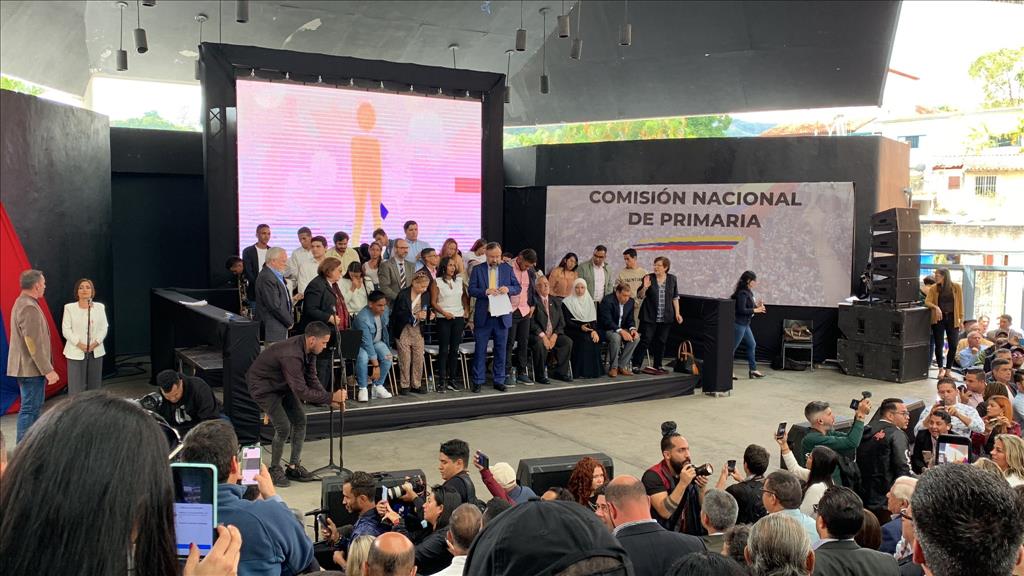(MENAFN- Venezuelanalysis) Caracas, February 18, 2023 (venezuelanalysis.com ) – Venezuelan opposition parties have laid out a road map to hold a primary contest to choose a presidential candidate.
A“National Primary Commission” (cnp ) appointed by the“Unitary Platform” that brings together a number of anti-government forces announced a schedule leading up to the primary vote on October 22.
“The die is cast. We will move forward with determination toward our target alongside all citizens who want a political change,” CNP President Jesús María Casal said during a press conference in Caracas on Wednesday. Casal is an attorney, academic and former Supreme Court justice.
According to a publicly released calendar , the candidate list will be completed in June, the electoral registry will be published in July and there will be nearly two months of campaigning ahead of the October 22 vote.
Presidential elections should be held in 2024 according to the Venezuelan constitution . However, electoral authorities have yet to announce a definitive date. In recent months, both government and opposition spokespeople brought up the possibility of the presidential elections being brought forward.
The upcoming primary contest represents the mainstream opposition's complete return to electoral politics after years of political gambits and electoral boycotts backed by unfounded“fraud” allegations.
Parties Democratic Action (AD), Justice First (PJ), A New Era (UNT) and Popular Will (VP) made up the bulk of the Democratic Unity Roundtable (MUD) coalition that won a majority in the 2015 National Assembly (AN) elections.
After unsuccessfully trying to oust the Nicolás Maduro government, the opposition AN fell into a dispute with the country's judicial authorities before being declared“null and void.” The US-backed anti-government groups doubled down, boycotting the 2018 presidential contest that saw Maduro win re-election and then supporting Juan Guaidó's self-proclaimed“interim government.”
Guaidó and his hardline faction pushed a number of failed coup attempts while Washington levied punishing sanctions in an effort to overthrow the Maduro administration. However, the strategy steadily lost support amidst opposition ranks, with the largest parties eventually terminating the“interim government” in polemical fashion to focus on the upcoming presidential election.
The US-backed parties previously participated in the November 2021 regional and local“mega-elections” that saw the ruling Socialist Party (PSUV) and its allies win significant majorities both in governorships and mayoralties.
The last opposition primaries were held in 2012, with PJ's Henrique Capriles winning out. He would then be soundly defeated by former President Hugo Chávez in the October 2012 presidential race. Capriles ran against Maduro in April 2013 following Chávez's death but lost once more, albeit by a narrow margin.
A number of opposition politicians have already declared their desire to run in the upcoming primaries, including Carlos Prosperi (AD), Carlos Ocariz (PJ), María Corina Machado (Vente Venezuela) and Guaidó himself (VP). Capriles and present Zulia governor Manuel Rosales, who also lost against Chávez in 2006, are widely expected to join the race as well.
Despite a number of spokespeople touting the need for unity, the opposition primaries risk being plagued by accusations and bitter infighting.
Early disagreements concern an eventual collaboration from Venezuela's National Electoral Council (CNE) in setting up the election. The Primary Commission has reportedly asked the CNE to set up a technical commission to evaluate possible support in terms of electoral centers and voter registration.
The news drew angry rebukes from some of the most fervent anti-government sectors, with Vente Venezuela claiming CNE support would“place strategic matters in the hands of the [Maduro] regime.”
Vente's political coordinator Henry Alviarez went on to accuse Democratic Action, Justice First and A New Era of“sabotaging” the process.
The opposition's primary process faces another significant hurdle in its expressed desire to allow Venezuelans abroad to participate as well. Though all factions have stated this as a priority, no details have been revealed to date.
The prospect of having a single candidate running against Maduro or another PSUV leader is likewise far from assured.
Parties of the so-called“Democratic Alliance” that broke with the Guaidó-led group in late 2019 and later ran in the 2020 legislative elections have criticized the primary process as“exclusive” and“sectarian.”
Similarly, Antonio Ecarri, from the newly formed“Pencil Alliance,” has expressed his intention of running for president but without going through the opposition primary. Ecarri finished second in the 2021 Caracas municipal election won by Carmen Meléndez (PSUV).
| Subscribe to our newsletter to get news and analysis in your inbox |
| Venezuelanalysis is 100% sustained by readers. Consider supporting our independent, on-the-ground work |




















Comments
No comment